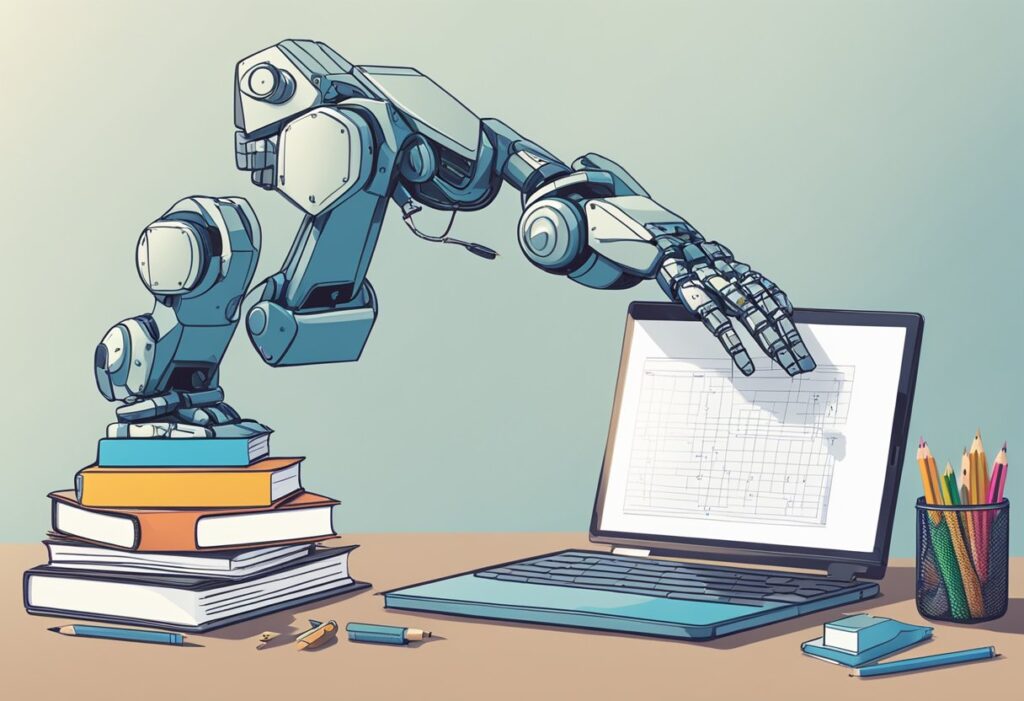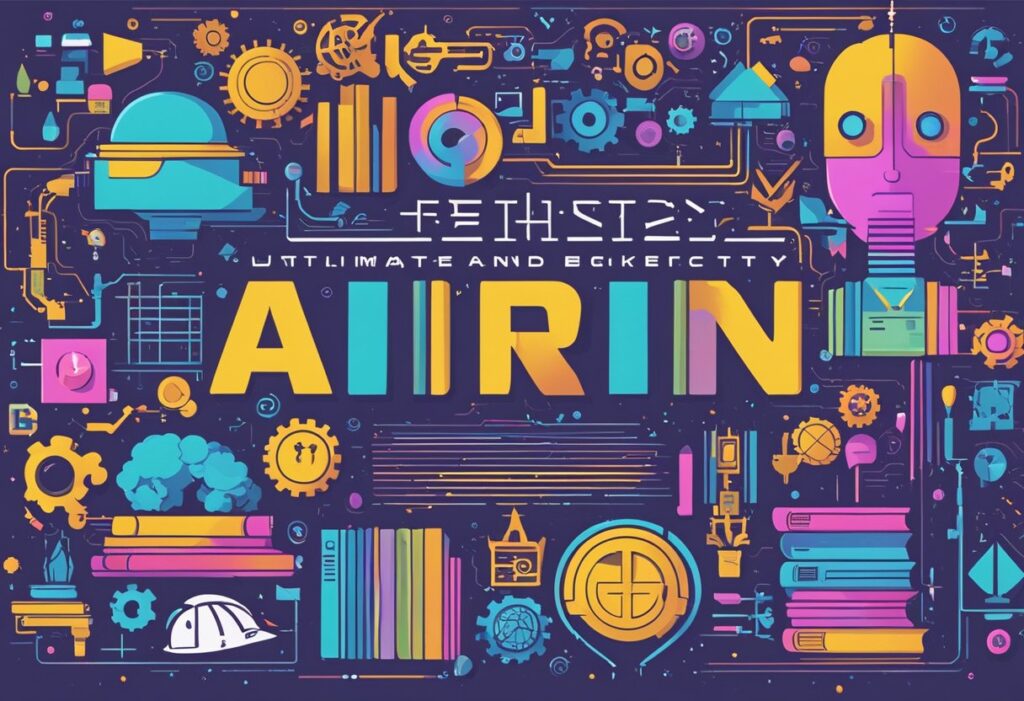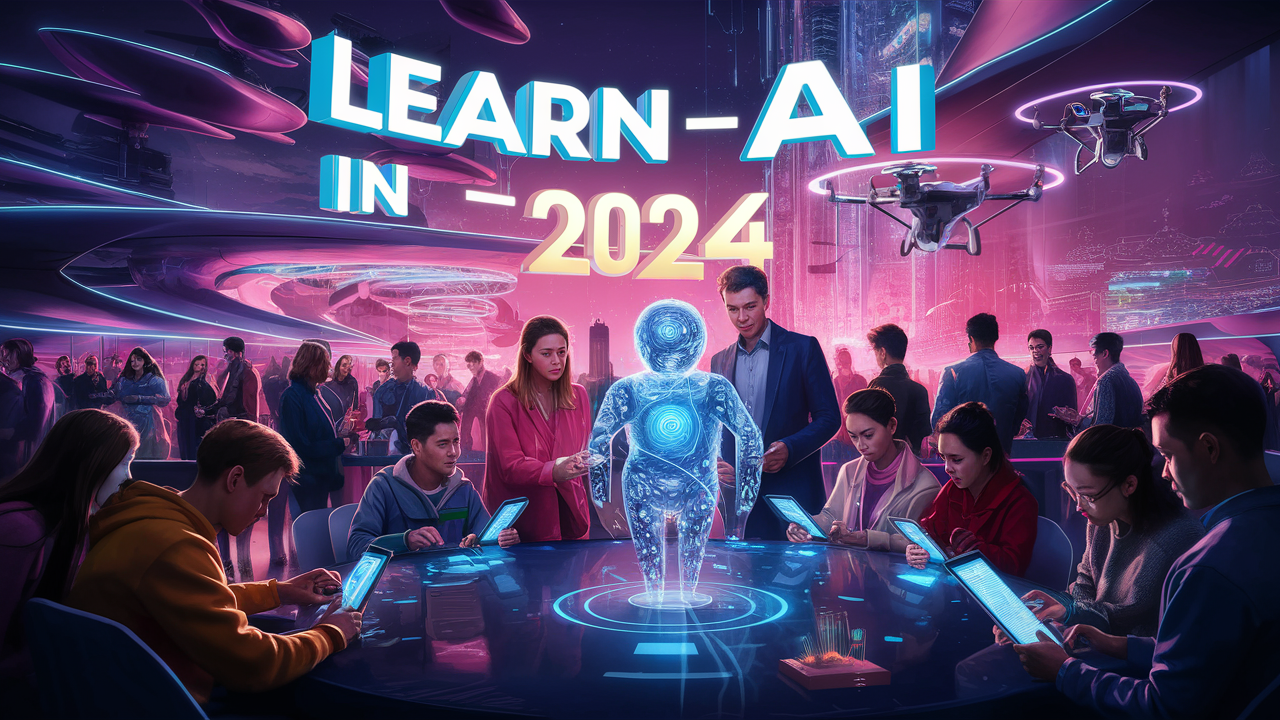Artificial Intelligence (AI) is one of the most transformative technologies of our time, and its impact is being felt across all industries. AI has the potential to revolutionize the way we work, live and interact with the world around us. With the rise of AI, there is a growing demand for professionals who have the skills and knowledge to work with this technology.

If you’re looking to learn AI in 2024, there are a variety of resources available to help you get started. From online courses and textbooks to hands-on projects, choosing the right resource can help you get off to a strong start with your AI learning. However, with so many resources available, it can be challenging to know where to begin.
This article provides a comprehensive guide for beginners looking to learn AI in 2024. It covers the fundamental concepts of AI, the skills you need to learn, and the resources you can use to get started. Whether you’re a student, a professional looking to upskill, or just someone interested in learning about AI, this guide will help you get started on your journey to mastering this transformative technology.
Understanding AI Fundamentals
Artificial Intelligence (AI) is a rapidly growing field that is changing the way we live and work. To learn AI, beginners must first understand its fundamentals. This section will cover the history of AI, key concepts, and types of AI.
History of AI
AI has its roots in the 1950s when computer scientists began exploring the possibility of creating machines that could simulate human intelligence. The field has since evolved to include various subfields such as machine learning, natural language processing, and computer vision. Today, AI is being used in a wide range of applications, from self-driving cars to virtual assistants.
Key Concepts in AI
To understand AI, beginners must first learn some key concepts. One of the most important concepts is machine learning, which involves training machines to learn from data. Another important concept is neural networks, which are modeled after the human brain and are used to process information. Other key concepts include natural language processing, which involves teaching machines to understand and generate human language, and computer vision, which involves teaching machines to interpret visual information.
Types of AI
There are two main types of AI: narrow AI and general AI. Narrow AI, also known as weak AI, is designed to perform a specific task, such as playing chess or recognizing faces. General AI, also known as strong AI, is designed to perform any intellectual task that a human can do. However, general AI is still a long way off and is currently the subject of much research and debate.
In conclusion, understanding the fundamentals of AI is essential for beginners who want to learn this exciting field. By learning about the history of AI, key concepts, and types of AI, beginners can gain a solid foundation that will help them as they delve deeper into the field.
Getting Started with AI
Artificial Intelligence (AI) is a rapidly growing field that is changing the way we live and work. If you are a beginner looking to learn AI, it can be overwhelming to know where to start. In this section, we will provide some tips on how to get started with AI.
Setting Realistic Goals
Before diving into AI, it is important to set realistic goals. AI is a complex field, and it can take years to become an expert. Therefore, it is important to start with small, achievable goals. For example, you can start by learning the basics of a programming language that is commonly used in AI, such as Python or R. Once you have a good understanding of the language, you can move on to more advanced topics such as machine learning.
Choosing the Right Programming Language
Choosing the right programming language is crucial when learning AI. Python is the most popular programming language for AI, and for good reason. It is easy to learn, has a large community, and has many libraries and frameworks that are specifically designed for AI. R is another popular language for AI, especially for data analysis and visualization.
When choosing a programming language, it is important to consider your goals and interests. If you are interested in machine learning, then Python is a good choice. If you are interested in data analysis and visualization, then R may be a better choice. Ultimately, the choice of programming language will depend on your personal preferences and goals.
In summary, getting started with AI involves setting realistic goals and choosing the right programming language. By following these tips, beginners can start their AI journey with confidence and clarity.
Mathematics for AI

When it comes to learning AI, mathematics is a crucial subject that one must master. The following subsections will discuss the specific areas of mathematics that are essential for AI.
Linear Algebra
Linear algebra is the foundation of many AI concepts, including deep learning. It is a branch of mathematics that deals with linear equations, matrices, vectors, and their operations. A solid understanding of linear algebra is necessary for building machine learning models that involve matrix operations.
Some of the key topics in linear algebra that one should focus on include matrix multiplication, determinants, eigenvalues, eigenvectors, and singular value decomposition. Understanding these concepts will help one to understand the workings of neural networks, which are at the heart of deep learning.
Calculus
Calculus is another essential area of mathematics that is used extensively in AI. It is a branch of mathematics that deals with rates of change and the accumulation of small changes. Calculus is used to optimize machine learning models by finding the minimum or maximum value of a function.
Some of the key topics in calculus that one should focus on include limits, derivatives, integrals, optimization, and partial derivatives. A solid understanding of these concepts will help one to understand the workings of optimization algorithms, which are used to train machine learning models.
Probability and Statistics
Probability and statistics are also crucial areas of mathematics that are used in AI. Probability is the branch of mathematics that deals with the likelihood of an event occurring, while statistics is the branch of mathematics that deals with the analysis of data.
Some of the key topics in probability and statistics that one should focus on include probability distributions, hypothesis testing, regression analysis, and Bayesian statistics. A solid understanding of these concepts will help one to understand the workings of machine learning models that involve probabilistic reasoning.
In conclusion, mastering mathematics is an essential step in learning AI. By focusing on the key areas of linear algebra, calculus, and probability and statistics, one can gain a solid foundation in mathematics that will help them to understand the workings of machine learning models.
Essential AI Tools and Frameworks
When it comes to learning AI, having access to the right tools and frameworks can make a significant difference. Here are some of the most essential tools and frameworks for beginners to get started with AI in 2024.
TensorFlow and PyTorch
TensorFlow and PyTorch are two of the most popular open-source frameworks for building and training machine learning models. TensorFlow is developed by Google, while PyTorch is developed by Facebook. Both frameworks are widely used in the industry and have extensive documentation and tutorials available online.
TensorFlow provides a wide range of APIs for building and training models, including high-level APIs like Keras and lower-level APIs like TensorFlow Core. PyTorch, on the other hand, is known for its ease of use and flexibility, making it a popular choice for researchers and academics.
Jupyter Notebooks
Jupyter Notebooks is an open-source web application that allows users to create and share documents that contain live code, equations, visualizations, and narrative text. It is an excellent tool for learning AI, as it allows users to experiment with code and see the results immediately.
Jupyter Notebooks supports multiple programming languages, including Python, R, and Julia, and has a large community of users who share their notebooks online. This makes it easy for beginners to find examples and learn from others.
Cloud AI Services
Cloud AI services like Amazon Web Services (AWS), Google Cloud Platform (GCP), and Microsoft Azure provide a range of tools and services for building and deploying machine learning models in the cloud. These services include pre-built models, data storage and processing, and tools for building and training custom models.
Using cloud AI services can be a cost-effective way for beginners to learn AI, as they can access powerful hardware and tools without having to invest in their own infrastructure. Additionally, cloud AI services often provide extensive documentation and tutorials to help users get started.
Practical AI Projects

Once you have a solid foundation of AI concepts, it’s time to start working on practical projects. This section will cover some practical AI projects that beginners can work on to gain hands-on experience and improve their skills.
Data Preprocessing
Data preprocessing is an essential step in any AI project. It involves cleaning, transforming, and organizing data to make it suitable for analysis. In this project, beginners can work on cleaning and preprocessing a dataset. They can use tools like Pandas and NumPy to manipulate and analyze the data. They can also use visualization libraries like Matplotlib and Seaborn to plot the data and gain insights.
Building Simple Models
Once the data is preprocessed, beginners can start building simple AI models. They can start with linear regression and logistic regression models, which are relatively easy to implement. They can also work on decision tree models, which are simple yet powerful. They can use libraries like Scikit-learn and TensorFlow to build and train these models.
Project Documentation
Documentation is an essential part of any AI project. In this project, beginners can work on documenting their code and project. They can use tools like Jupyter Notebook to write and document their code. They can also use tools like GitHub to store and share their code with others. Proper documentation will help beginners keep track of their progress and make it easier for others to understand their work.
Overall, these practical AI projects will help beginners gain hands-on experience and improve their skills. By working on these projects, beginners will be able to apply their knowledge to real-world problems and build a strong foundation in AI.
Learn AI witht the professionals

Executive Masters in AI Tools for Businesses
AI Ethics and Society

As the use of Artificial Intelligence (AI) becomes increasingly important in society, ethical considerations must be taken into account. AI has the potential to significantly impact society, and it is important to ensure that it is used in a responsible and ethical manner. In this section, we will explore some of the ethical considerations surrounding AI and its impact on society.
Bias and Fairness
One of the biggest ethical concerns surrounding AI is the issue of bias and fairness. AI systems are only as unbiased as the data they are trained on. If the data is biased, the AI system will also be biased. This can have serious consequences, particularly in areas such as hiring and lending, where bias can lead to discrimination.
To address this issue, it is important to ensure that the data used to train AI systems is representative and diverse. This can be achieved by using a variety of data sources and ensuring that the data is properly labeled and annotated. It is also important to regularly audit AI systems to ensure that they are not exhibiting bias.
Privacy and Security
Another important ethical consideration surrounding AI is the issue of privacy and security. AI systems often collect and process large amounts of data, which can include sensitive personal information. It is important to ensure that this data is properly protected and that individuals’ privacy rights are respected.
To address this issue, it is important to implement strong security measures, such as encryption and access controls. It is also important to ensure that individuals are aware of how their data is being used and to obtain their consent before collecting and processing their data.
Future of Work
The increasing use of AI is also raising concerns about the future of work. Many people are worried that AI will lead to job losses and increased automation. While it is true that AI has the potential to automate many jobs, it is also creating new opportunities and industries.
To address this issue, it is important to ensure that workers are properly trained and equipped to work alongside AI systems. This may involve providing training in new skills and technologies, as well as developing new policies and regulations to protect workers’ rights.
In summary, AI has the potential to significantly impact society, and it is important to ensure that it is used in a responsible and ethical manner. By addressing issues such as bias and fairness, privacy and security, and the future of work, we can ensure that AI is used to benefit society as a whole.
Staying Updated in AI
Learning AI is a continuous process that requires staying up-to-date with the latest research, technologies, and trends. Here are some ways beginners can stay updated in AI:
Research Papers
Reading research papers is one of the best ways to stay updated on the latest developments in AI. Many AI researchers publish their work in peer-reviewed journals and conferences. Beginners can start by reading papers from top conferences such as NeurIPS, ICML, and ICLR. They can also follow researchers on platforms such as arXiv and Google Scholar to receive notifications when new papers are published.
Online Communities
Online communities provide a platform for AI enthusiasts to share knowledge, ask questions, and stay updated on the latest developments in AI. Beginners can join online communities such as Reddit’s r/MachineLearning, Kaggle, and AI Stack Exchange to interact with other AI enthusiasts and stay updated on the latest trends.
Conferences and Workshops
Attending conferences and workshops is a great way to stay updated on the latest developments in AI. Many conferences and workshops provide opportunities for beginners to learn from experts, network with other AI enthusiasts, and showcase their work. Some of the top AI conferences and workshops include NeurIPS, ICML, ICLR, AAAI, and CVPR.
In conclusion, staying updated in AI is crucial for beginners who want to keep up with the latest trends and developments in the field. By reading research papers, joining online communities, and attending conferences and workshops, beginners can stay up-to-date with the latest developments in AI and improve their skills.
Career Paths in AI
Artificial Intelligence is a rapidly growing field, and there are many career paths to explore. In this section, we will discuss some of the most popular career paths in AI.
Industry Roles
AI is being used in many industries, and there are plenty of opportunities for those interested in working in the field. Some of the most common industry roles in AI include:
- AI Engineer: responsible for designing and developing AI systems.
- Data Scientist: responsible for analyzing and interpreting complex data sets to identify patterns and trends.
- Machine Learning Engineer: responsible for developing algorithms and models that enable machines to learn from data.
- Research Scientist: responsible for conducting research to advance the field of AI.
Academic Research
For those interested in pursuing a career in academia, there are many opportunities to conduct research in the field of AI. Some of the most common academic research roles in AI include:
- Professor: responsible for teaching and conducting research in the field of AI.
- Postdoctoral Researcher: responsible for conducting research in AI under the supervision of a professor.
- Research Scientist: responsible for conducting research to advance the field of AI.
Entrepreneurship in AI
Entrepreneurship in AI is a growing field, and there are many opportunities for those interested in starting their own AI-based business. Some of the most common entrepreneurship roles in AI include:
- Founder/CEO: responsible for leading the development and growth of an AI-based business.
- Product Manager: responsible for overseeing the development and launch of AI-based products.
- Data Scientist: responsible for analyzing and interpreting complex data sets to identify patterns and trends.
In conclusion, there are many career paths to explore in the field of AI. Whether you are interested in industry roles, academic research, or entrepreneurship, there are plenty of opportunities to pursue your passion for AI.




